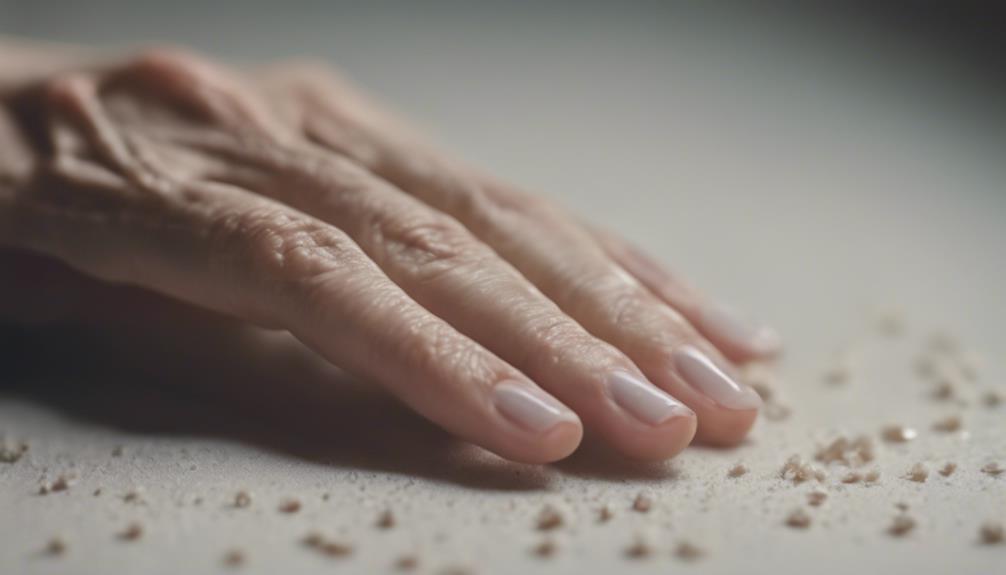What Deficiency Causes Nails Stop Growing?

Nutritional deficiencies in iron, vitamin B12, zinc, protein, vitamin C, biotin, omega-3 fatty acids, and magnesium can halt nail growth. These deficiencies affect nail strength and overall health. Understanding the impact of these deficiencies is crucial for maintaining optimal nail conditions and growth.
Key Takeaways
- Iron deficiency can cause halted nail growth due to inadequate oxygen supply.
- Vitamin B12 deficiency affects red blood cell production essential for nail nutrient delivery.
- Zinc deficiency is linked to impaired nail growth and health, leading to brittleness.
- Protein deficiency impacts nail growth rate by hindering cell regeneration and keratin production.
- Vitamin C deficiency significantly affects nail growth and strength by hampering collagen synthesis.
Iron Deficiency

Iron deficiency is a common cause of stopped nail growth in individuals. Iron plays a crucial role in maintaining healthy nail growth by supporting the production of hemoglobin, which carries oxygen to the nail matrix. When levels of iron are low, oxygen delivery to the nails is compromised, leading to brittle and slow-growing nails. This deficiency can result from various factors such as inadequate dietary intake, poor absorption, or chronic blood loss.
Innovative solutions for addressing iron deficiency and promoting nail growth include incorporating iron-rich foods like spinach, lentils, and lean meats into one's diet. Additionally, iron supplements may be recommended by healthcare professionals to help restore optimal levels in the body. Regular monitoring of iron levels through blood tests can ensure that any deficiencies are promptly identified and addressed. By focusing on improving iron status, individuals can support healthy nail growth and overall well-being. Remember, healthy nails are not just a cosmetic concern but also a reflection of one's internal health.
Vitamin B12 Deficiency
A deficiency in Vitamin B12 can also contribute to halted nail growth in individuals. Vitamin B12 plays a crucial role in the production of red blood cells, which are responsible for supplying nutrients and oxygen to the nail matrix, where nail cells are formed. When Vitamin B12 levels are inadequate, this process can be disrupted, leading to slow or stopped nail growth. Here are four ways in which Vitamin B12 deficiency can impact nail health:
- Brittle Nails: Low levels of Vitamin B12 can result in brittle nails that are prone to breakage and splitting.
- Pale Nail Beds: Vitamin B12 deficiency may cause the nail beds to appear pale due to decreased oxygen supply.
- Slow Nail Growth: Insufficient Vitamin B12 can slow down the rate of nail growth, leading to shorter nails.
- Ridges on Nails: Vitamin B12 deficiency can manifest as vertical ridges on the nails, affecting their appearance and texture.
Zinc Deficiency

Inadequate levels of zinc in the body have been linked to impaired nail growth and health. Zinc is an essential mineral that plays a crucial role in various bodily functions, including the growth and development of nails. A deficiency in zinc can lead to brittle nails that are prone to breaking and slow growth. Ensuring sufficient zinc levels through diet or supplements can help promote healthy nail growth and strength.
To highlight the importance of zinc for nail health, let's explore a comparison between the recommended daily intake of zinc and some zinc-rich foods:
| Recommended Daily Intake of Zinc | Zinc-Rich Foods |
|---|---|
| Adults: 8-11 mg | Oysters |
| Children: 2-8 mg | Beef |
| Pregnant Women: 11-12 mg | Chickpeas |
| Vegetarians: 50% more than non-vegetarians | Pumpkin Seeds |
| Breastfeeding Women: 12-13 mg | Cashews |
Including zinc-rich foods in your diet can help maintain optimal levels of zinc and support healthy nail growth.
Protein Deficiency
Protein deficiency can significantly impact the growth rate of nails, leading to slowed or stopped nail growth. Additionally, brittle nails are a common symptom of inadequate protein intake, which can affect the overall health and appearance of nails. Understanding dietary protein sources is crucial in addressing and preventing protein deficiency-related issues that can impede nail growth.
Impact on Growth Rate
Insufficient intake of essential amino acids can significantly hinder the speed at which nails grow. This deficiency can have a notable impact on the growth rate of nails, leading to slower development and potential stagnation in growth. To further understand how protein deficiency affects nail growth, consider the following:
- Cellular Repair: Protein is essential for cell regeneration, which directly influences nail growth.
- Keratin Production: Amino acids are crucial for the production of keratin, the key structural protein in nails.
- Blood Circulation: Protein deficiency can affect blood flow to the nail bed, impacting nutrient delivery for growth.
- Overall Health: Poor protein intake can weaken the overall health of nails, affecting their growth rate.
Brittle Nail Condition
Brittle nails often indicate a lack of essential nutrients required for optimal nail health and strength. Protein deficiency, in particular, can lead to brittle nail condition. Proteins are crucial for the formation of keratin, the protein that makes up our nails. When the body lacks an adequate amount of protein, it can result in weak and brittle nails that are prone to breakage and slow growth. To combat this issue, incorporating protein-rich foods into your diet is essential. Foods such as lean meats, fish, eggs, dairy products, legumes, nuts, and seeds can help improve nail health by providing the necessary building blocks for strong and resilient nails. Remember, a balanced diet rich in protein is key to maintaining healthy nails.
Dietary Protein Sources
Adequate intake of various protein-rich foods is essential for maintaining optimal nail health and strength, as proteins play a crucial role in the formation of keratin, the primary component of nails. Ensuring a well-rounded diet that includes the following protein sources can help prevent protein deficiency and promote healthy nail growth:
- Lean Meats: Chicken, turkey, and lean cuts of beef are excellent sources of high-quality protein.
- Fish: Salmon, tuna, and sardines provide protein along with omega-3 fatty acids that support nail health.
- Eggs: A complete protein source that also contains biotin, a nutrient important for nail strength.
- Legumes: Beans, lentils, and chickpeas offer plant-based protein rich in essential amino acids for nail growth.
Vitamin C Deficiency
A deficiency in vitamin C can significantly impact the growth and health of nails. Vitamin C, also known as ascorbic acid, is a powerful antioxidant essential for collagen synthesis. Collagen is a key structural protein that provides strength and resilience to nails. In the absence of an adequate amount of vitamin C, collagen production is hindered, leading to brittle and slow-growing nails.
Furthermore, vitamin C plays a vital role in promoting blood circulation to the nail beds, ensuring that essential nutrients reach the nails for optimal growth. The lack of vitamin C can result in weakened blood vessels, reducing the nutrient supply to the nails and impairing their growth and quality.
To prevent vitamin C deficiency and support healthy nail growth, incorporating vitamin C-rich foods such as citrus fruits, strawberries, bell peppers, and kiwis into your diet is crucial. In cases where dietary intake is insufficient, vitamin C supplements can be considered under the guidance of a healthcare provider. Ensuring adequate vitamin C levels is essential for maintaining strong, vibrant nails.
Biotin Deficiency

Biotin, also known as vitamin B7, plays a crucial role in maintaining healthy nails. Symptoms of biotin deficiency can include brittle nails that are prone to breakage and slow growth. Treatment options for biotin deficiency often involve dietary changes or supplementation to support nail health.
Role of Biotin
Insufficient intake of biotin can lead to a deficiency that may contribute to slowed or stopped nail growth. Biotin, also known as vitamin B7, plays a crucial role in maintaining healthy nails by supporting the proteins that make up the nail structure. Here are four key points highlighting the role of biotin in nail growth:
- Protein Synthesis: Biotin is essential for the synthesis of keratin, a key structural protein in nails.
- Cell Proliferation: Biotin promotes cell proliferation in the nail matrix, where nail growth begins.
- Moisture Retention: Biotin helps nails retain moisture, preventing them from becoming brittle and prone to breakage.
- Nutrient Absorption: Biotin aids in the absorption of other nutrients that are important for nail health, such as iron and zinc.
Symptoms of Deficiency
Symptoms indicative of biotin deficiency may manifest as changes in nail texture and quality, among other health issues. Biotin, also known as vitamin B7, plays a crucial role in maintaining the health of our hair, skin, and nails. When deficient, individuals may experience brittle nails that are prone to breaking, thinning, or displaying unusual ridges. Hair loss, dry skin, fatigue, and muscle pains are also common symptoms associated with biotin deficiency. In severe cases, individuals may develop a condition known as alopecia, characterized by sudden hair loss. Early recognition of these symptoms is essential for prompt intervention and prevention of further complications. If you suspect a biotin deficiency, consulting a healthcare professional for proper diagnosis and guidance is recommended.
Treatment Options
In addressing biotin deficiency, healthcare professionals often recommend supplementation with appropriate doses of vitamin B7 to support nail growth and overall health. When treating biotin deficiency to promote nail growth, the following innovative approaches can be considered:
- Dietary Modifications: Encourage the consumption of biotin-rich foods such as nuts, seeds, eggs, and whole grains.
- Topical Treatments: Explore the use of biotin-infused nail oils or creams to provide direct nourishment to the nails.
- Consultation with a Dermatologist: Seek guidance from a dermatologist for personalized treatment plans and monitoring.
- Regular Monitoring: Conduct routine blood tests to track biotin levels and adjust supplementation as needed for optimal nail health.
Omega-3 Fatty Acid Deficiency

A deficiency in omega-3 fatty acids can negatively impact the growth of nails. Omega-3 fatty acids play a crucial role in maintaining overall nail health by nourishing the nail bed and supporting the structure of the nail. When the body lacks an adequate amount of omega-3 fatty acids, nails can become brittle, weak, and prone to breakage, which in turn hinders their growth potential.
Omega-3 fatty acids are known for their anti-inflammatory properties, which can help in reducing inflammation around the nail bed that may be inhibiting proper growth. Additionally, these essential fatty acids contribute to maintaining proper blood circulation, ensuring that the nail bed receives an ample supply of nutrients and oxygen essential for healthy nail growth.
Incorporating omega-3-rich foods such as fatty fish, chia seeds, flaxseeds, and walnuts into your diet can help alleviate omega-3 fatty acid deficiency and promote optimal nail growth. Alternatively, omega-3 supplements can also be considered to ensure an adequate intake of these vital nutrients for healthy nails.
Magnesium Deficiency
Insufficient levels of magnesium in the body can also significantly impact the growth and health of nails. Magnesium is an essential mineral that plays a crucial role in various bodily functions, including nail growth. Here are four ways magnesium deficiency can affect the health and growth of nails:
- Reduced Protein Synthesis: Magnesium is essential for protein synthesis, which is necessary for the formation of keratin, the protein that makes up nails. A lack of magnesium can lead to slower nail growth and weaker nails.
- Poor Blood Circulation: Magnesium deficiency can impair blood circulation, leading to decreased nutrient delivery to the nail bed. This can result in brittle nails that are more prone to breakage.
- Increased Inflammation: Low magnesium levels can contribute to chronic inflammation, affecting the overall health of nails and potentially causing them to stop growing.
- Weakened Nail Structure: Magnesium deficiency may result in a lack of proper nail structure, making nails more susceptible to damage and stunted growth.
Frequently Asked Questions
Can Stress or Lack of Sleep Affect Nail Growth?
Stress and lack of sleep can impact nail growth due to their effects on overall health. Stress may disrupt the body's natural processes, affecting nutrient absorption. Adequate rest is essential for cell regeneration, including nail growth.
Are There Any Specific Foods That Can Help Promote Nail Growth?
Certain foods rich in biotin, protein, zinc, and iron can promote nail growth. Incorporating eggs, nuts, seeds, fish, lean meats, and leafy greens into your diet can help strengthen nails and encourage healthy growth.
How Long Does It Take for Nails to Start Growing Again After a Deficiency Is Corrected?
The duration for nail regrowth post-deficiency correction varies depending on individual health, lifestyle factors, and the specific deficiency addressed. Generally, nails may begin to grow again within a few weeks to a couple of months once the deficiency is rectified.
Are There Any Lifestyle Factors, Such as Smoking or Excessive Alcohol Consumption, That Can Impact Nail Growth?
Various lifestyle factors, including smoking and excessive alcohol consumption, can indeed impact nail growth. These habits can hinder the body's ability to absorb essential nutrients crucial for healthy nail development, leading to slower growth and potentially weaker nails.
Can Certain Medical Conditions, Such as Thyroid Disorders, Affect Nail Growth Even if There Is No Deficiency Present?
Certain medical conditions, like thyroid disorders, can indeed impact nail growth, even in the absence of a deficiency. Understanding the interplay between health conditions and nail health is crucial for comprehensive care and management.




